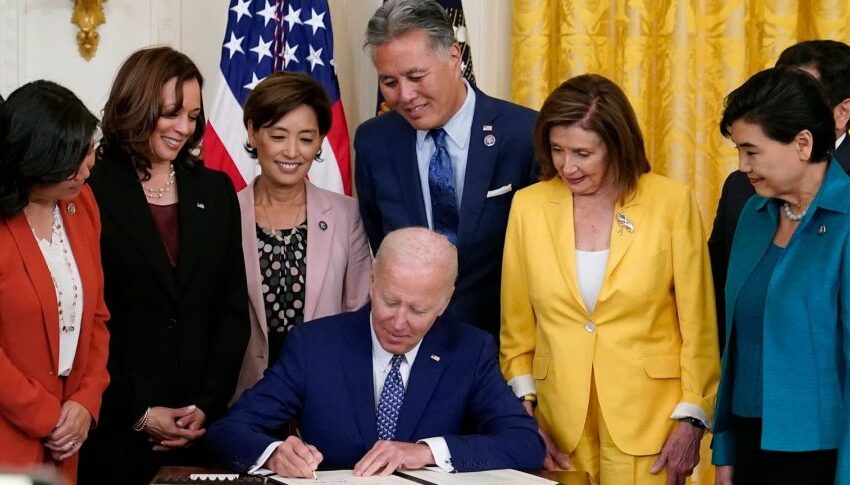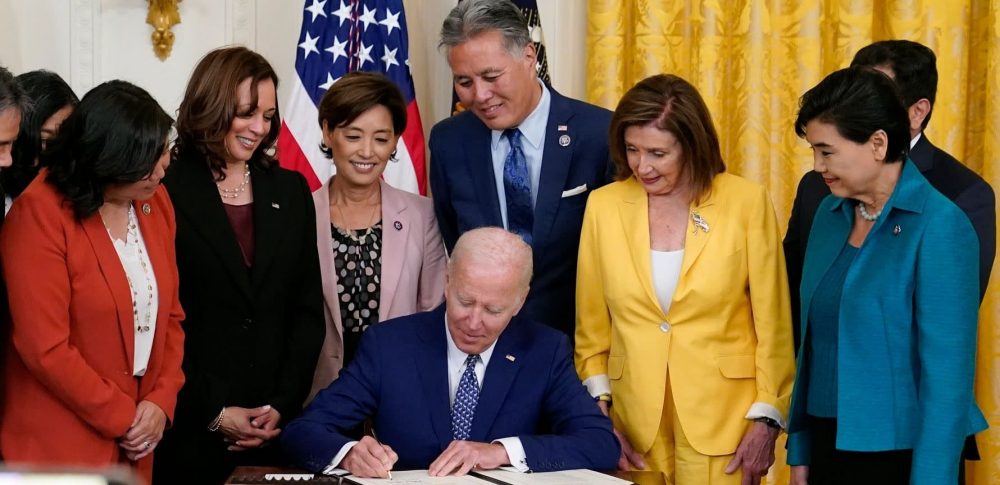White House releases national strategy for AANHPI communities

 Strategy includes expanding language access; Urdu, Arabic, Gujarati, Bengali, Punjabi among 20 foreign languages
Strategy includes expanding language access; Urdu, Arabic, Gujarati, Bengali, Punjabi among 20 foreign languages
The Biden-Harris Administration Tuesday released its first-ever National Strategy to Advance Equity, Justice, and Opportunity for Asian American, Native Hawaiian, and Pacific Islander (AA and NHPI) communities.
The new strategy, which comprises action plans prepared by 32 federal agencies—including all 15 executive departments in the President’s Cabinet— includes expanding language access across federal programs, according to the White House.
Read: Biden signs bill to establish AAPI museum commission (June 14, 2022)
It builds on the Administration’s broader equity agenda and details much needed investments in AA and NHPI communities and priorities, including data disaggregation, language access, and combatting anti-Asian hate, a fact sheet released Tuesday said.
Federal agencies are taking critical action to expand access for limited English proficient communities and deliver greater equity for the diverse AA and NHPI community, it said.
The Internal Revenue Service has developed landing pages on IRS.gov in 20 foreign languages including Chinese (Simplified and Traditional), Vietnamese, Korean, Tagalog, Khmer, Japanese, Urdu, Arabic, Gujarati, Bengali, and Punjabi.
The Food and Drug Administration developed culturally and linguistically tailored Covid-19 health messages and the Department of Homeland Security has translated, among other things, its National Terrorism Advisory System Bulletin.
The Federal Communications Commission, the Federal Trade Commission and the Social Security Administration have also expanded language access.
President Joe Biden signed Executive Order 14031 in May 2021, delivering on his commitment to establish and reinvigorate the White House Initiative on Asian Americans, Native Hawaiians, and Pacific Islanders (WHIAANHPI).
In the Executive Order, the President directed the development of an ambitious, government-wide interagency plan to advance equity, justice, and opportunity for AA and NHPI communities, White House said.
Read: Biden naming 4 Indian Americans to presidential body on AANHPI communities (December 21, 2021)
Since Day One, the Administration has prioritized the needs of AA and NHPI communities by advancing policies that promote equity, reducing barriers to accessing federal services and programs, and centering the experiences and resiliency of AA and NHPIs, White House said.
Other initiatives listed in the strategy including promoting belonging and inclusion and addressing anti-Asian hate/discrimination.
Across the federal government, agencies have stepped up their efforts to respond to the increasing number of bias incidents and discrimination against AA and NHPIs, promote belonging, equity, and inclusion, and improve access to federal resources, White House said.
The Department of Justice developed an array of resources to provide local officials, community leaders and residents, law enforcement, and victims with the tools to help prevent and address hate crimes and incidents, including a webpage specifically to address hate crimes and incidents against AAs and NHPIs with instructions on how to report a hate crime to the Federal Bureau of Investigation in 24 languages.
The Department of Justice and the Department of Education jointly issued a letter to educators on May 26, 2021, and a fact sheet addressing the increased harassment and violence directed at Asian American and Pacific Islander (AAPI) students and reminded schools about their role in addressing discrimination, including harassment, against AAPI students.
Over the past year, the US Agency for International Development hosted more than 20 “Urgent Hate Crimes Response/Support” meetings to provide a proactive response to the surge in anti-Asian hate crimes across the nation.
Read: White House releases 1st national strategy to uplift AANHPI communities (January 17, 2023)
These meetings created pathways to ensure that AA and NHPI community members felt safe physically returning to work, addressed the interpersonal challenges within the workplace, and sustained a respectful, equitable, and just workplace environment, White House said.
Other initiatives include addressing the systemic lack of data disaggregation on aa and nhpi communities, building capacity in aa and nhpi communities and increasing outreach and engagement efforts and cultivating community partnerships.
To ensure that government policies are informed by and reflect the needs of the AA and NHPI community, agencies are engaging in meaningful outreach efforts to hear from community stakeholders, deepen partnerships, and expand access to government programs, the White House said.
